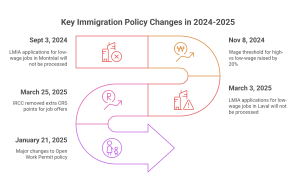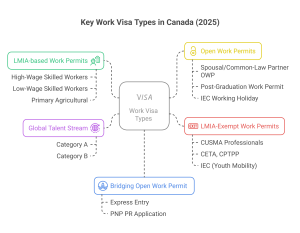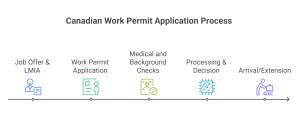Canada Work Visa Options in 2025: Latest News & Pathways
Canada continues to welcome skilled workers in 2025 through various work permit programs, but the rules are evolving. Recent policy updates affect Labour Market Impact Assessments (LMIAs), Global Talent Stream (GTS) applications, open work permits for family members, and provincial immigration streams. Understanding these changes is crucial for anyone seeking a Canada work visa in 2025. Below, we break down the newest immigration policy updates, explain each major work visa type, outline high-demand occupations and provincial needs, detail eligibility and application steps, and explain why UW Immigration (Deepika Minhas, RCIC) is your best guide.
Latest News & Immigration Policy Updates (2025)
- LMIA Changes: As of late 2024 and into 2025, Canada tightened LMIA rules. The high-wage and low-wage streams saw new requirements. Employers must now pay 20% above the regional median wage for high-wage positions, and the low-wage streams face stricter caps: low-wage LMIAs are now refused in cities with ≥6% unemployment (with some exemptions). For example, from Sept 3, 2024 to Nov 30, 2025, LMIA applications for low-wage jobs in Montréal (and from March 3, 2025 in Laval) will not be processed. In some sectors (construction, healthcare, food/agriculture), the previous 30% or 20% low-wage caps have been reduced to 10% of an employer’s workforce. Also, the wage threshold used to define high- vs low-wage was raised by 20% (effective Nov 8, 2024). Notably, legal attestations can no longer be used to prove business legitimacy on LMIA applications (no more CPA/lawyer letters)
- LMIA Processing Times: Service Canada reports that LMIA applications vary by stream. As of May 2025, Global Talent Stream applications averaged only 7 business days (about 1–2 weeks), while high-wage and low-wage LMIAs took ~50 days on average. Employers planning hires should check the latest processing times, but GTS remains the fastest option.
- Global Talent Stream (GTS): The GTS is unchanged in structure for 2025 but remains a key option for tech and innovative firms. It still has Category A (employer referral by a designated partner for “unique talent”) and Category B (on the in-demand occupations list). GTS work permits continue to be processed very quickly (around 1–2 weeks). Note: beginning in 2025, several Employer-of-Record (EOR) firms announced they will no longer sponsor GTS visa renewals due to new IRCC compliance requirements (employers now must demonstrate direct supervision and knowledge transfer, etc.). However, companies can still hire through GTS by following the updated rules.
- Open Work Permit (OWP) Policy Changes: A major change effective January 21, 2025 restricts family open work permits. Now, only spouses of certain temporary residents can apply for an OWP. Specifically, spouses of international students must be enrolled in qualifying programs (master’s ≥16 months, doctoral, or select post-secondary programs). Spouses of foreign workers must be working in TEER 0 or 1 occupations, or select TEER 2/3 occupations in priority sectors (sciences, health, construction, natural resources, education, sports/military). The foreign worker must also have ≥16 months remaining on their permit. Dependent children of workers are no longer eligible for OWPs. (Existing valid OWPs remain valid, and renewals are allowed under the same criteria.) In short, spousal OWPs are now more limited, reflecting labor-market priorities.
- Provincial Rules & Compliance: Provinces continue to target their specific needs. For example, British Columbia prioritizes tech, health, and construction occupations (see below). Alberta’s immigration program focused recent draws on health-care occupations. Employer compliance enforcement is also ramping up: new fines (up to $1 million) and bans apply for violating TFWP rulespeninsulagrouplimited.com. Immigration Canada noted that spouses of workers under free-trade agreements (CUSMA, CETA, etc.) will not be affected by these OWP restrictions, preserving those LMIA‑exempt pathways.
- Express Entry Updates: For completeness, note that as of March 25, 2025 IRCC removed the extra CRS points for valid job offers (including LMIA-supported offers). While this change impacts permanent residence selection rather than work permits, it underscores the federal focus on labour-market integrity.
Key Work Visa Types (2025)
- LMIA-based Work Permits: These are employer-specific (closed) work permits that require a positive Labour Market Impact Assessment. Employers first apply to Service Canada (ESDC) for an LMIA by advertising the job and demonstrating no Canadian is available. If the LMIA is approved, the foreign worker applies online for a work permit, supplying the LMIA letter, job offer, personal ID, qualifications, and other documents (medical, police certificate, etc.). Common streams include High-Wage and Low-Wage Skilled Workers, Primary Agricultural, and the new Permanent Residence stream for workers in ESDC’s approved list. Processing varies: the Global Talent Stream (a special LMIA for high-skill roles) targets very fast decisions (~7 days), while regular streams may take several weeks or months.
- Global Talent Stream (GTS): Part of the Global Skills Strategy, GTS helps Canadian companies hire tech and highly-skilled staff quickly. It has two categories: Category A (for firms with a referral who need unique talent; usually requires an LMBP and high salary of ~$80K+) and Category B (for occupations on an in-demand list, without a referral). Eligible occupations include software engineers, IT managers, data scientists, etc. Employers must submit a Labour Market Benefits Plan and pay a $1,000 fee per position. Successful Category A/B applications still yield an LMIA (LMIA-based work permit) but with expedited processing (often under 2 weeks).
- Open Work Permits (OWP): An OWP allows foreign nationals to work for any employer. Common OWPs include:
- Spousal/Common-Law Partner OWP: For qualifying spouses of international students or skilled workers. (Note new 2025 rules: only spouses of master’s (≥16 months), doctoral or select students, and spouses of workers in certain TEER 0/1/selected 2-3 occupations are eligible.)
- Post-Graduation Work Permit (PGWP): For international graduates of Canadian post-secondary programs. (PGWPs are employer- and location-unrestricted.)
- IEC Working Holiday: Young adults (usually 18–35) from partner countries can get open work permits to work and travel in Canada for up to 1–2 years.
- Other policy OWPs: Occasional programs (e.g. COVID-related, humanitarian) and youth mobility agreements (Japan, S. Korea, etc.).
- Bridging Open Work Permit (BOWP): This special open work permit is for permanent residence applicants waiting for a decision. If you have a valid work permit (or maintained status), have submitted an Express Entry or PNP PR application, and received your Acknowledgment of Receipt (AOR) from IRCC, you can apply for a BOWP. This lets you continue working in Canada (no employer restrictions) while your PR file is processed. BOWP applications require the AOR letter and relevant PR stream documents.
- LMIA-Exempt Work Permits (International Agreements and Others): Certain work permits do not need an LMIA under trade or mobility agreements. For example:
- CUSMA Professionals (TN work permit): Canadians and Mexicans in eligible occupations (accountant, engineer, teacher, etc.) can obtain an OWP-type permit under the Canada–USMCA trade deal.
- CETA, CPTPP, etc.: Nationals from EU, UK, and Pacific countries enjoy LMIA-exempt access for business visitors, intra-company transferees, professionals, and investors under free-trade agreements.
- IEC (Youth Mobility): As above, working holiday permits are employer-open.
- Provincial/Territorial Programs: In some cases, a provincial nomination or pilot (e.g. Atlantic Immigration Pilot) grants an OWP to support permanent residence.
Targeted Occupations & Provincial Demand
Canada’s economy has strong demand for workers in several key sectors in 2025. Nationally, health care, IT and tech, skilled trades, agriculture/food processing, and transport/logistics are high on the list. For example, IRCC’s new category-based draws target health-care professionals and skilled trades (carpenters, plumbers, welders), education and childcare workers, and STEM occupations. The Federal government explicitly cites natural and applied sciences, construction, health care, natural resources, education among priority areas. As a result, workers like nurses, physicians, computer engineers, software developers, electricians, and heavy-duty mechanics are in great demand across Canada. Truck drivers and agri-food workers are also sought in many regions.
Province-specific programs further highlight demand niches:
- British Columbia: The BC PNP (including the Tech Pilot) actively targets technology and healthcare skills. The province’s priority occupation list for its Skills Immigration stream includes numerous tech roles (software developers, data scientists, IT managers, network technicians, etc.) and health occupations (nurses, therapists)welcomebc.cawelcomebc.ca. In fact, B.C. issues fast-track invitations for in-demand tech professionals under its Tech Pilot programwelcomebc.ca. The Skills Immigration stream also has priority lists for construction trades (electricians, plumbers, carpenters) and social services (childcare workers, social workers)welcomebc.cawelcomebc.ca.
- Alberta: The Alberta Advantage program recently focused on health care. In a June 2025 draw, Alberta invited 36 candidates all in health care professions (physicians, nurses, therapist, social workers, etc.) through its Dedicated Health Care Pathway. Alberta’s energy and construction sectors also need engineers, technologists, and skilled trades. Alberta’s pathways allow international applicants with job offers or Express Entry profiles to fill these high-demand roles.
- Other Provinces: Ontario emphasizes tech and finance, often drawing software developers and engineers. Saskatchewan seeks agri-food specialists and manufacturing workers, and Manitoba targets semi-skilled trades. The Atlantic provinces (Nova Scotia, NB, PEI, Newfoundland) have spaces for care workers, IT, hospitality and skilled trades. Each PNP maintains occupation lists reflecting local labour needs. (Check specific provincial nominee sites for the latest priority occupations.)
Overall, Canada’s in-demand jobs in 2025 remain in care (nurses, doctors, aides), STEM (IT, engineering, data), trades (electricians, welders, heavy equipment), and agriculture/logistics. Fast-growing tech hubs (e.g. Vancouver, Toronto, Montreal) need software pros, while every province needs health professionals and tradespeople.
Eligibility and Application Process
- Who Qualifies:
- LMIA Work Permits: Any foreign worker with a valid job offer from a Canadian employer who has obtained a positive LMIA. Workers must meet the job’s requirements (education/experience) and immigration admissibility (health, security).
- Global Talent Stream: Targeted at highly-skilled positions. Category B occupations (like software engineers, engineers, scientists) are in the list. For Category A, the applicant needs an innovative company referral (e.g. from a VITP) and exceptional skills. Salaries must meet the high GTS wage thresholds.
- Spousal OWP: Spouses/common-law partners of eligible foreign workers or students (meeting the 2025 criteria above). The couple must show a genuine relationship and that the principal holds status.
- International Graduates: Post-secondary graduates of Canadian institutions qualify for a PGWP (up to 3 years).
- Bridging Open Work Permit: Applicants must be principal applicants who have submitted a complete PR application (Express Entry or PNP) and have an Acknowledgment of Receipt. You also must have valid or maintained status as a worker.
- CUSMA/CETA Professionals: Citizens of the US, Mexico (CUSMA) or EU/UK (CETA) in list occupations who have a job offer in Canada. They need to prove professional credentials and the nature of the work matches the trade agreement categories.
- IEC Working Holiday: Citizens of participating countries aged 18–35 (or 18–30, depending on the country) with a clean record. Applicants enter a quota-driven pool and, if selected, receive an open work permit for up to one or two years.
- Application Steps: (Summary)
- Job Offer & LMIA (if required): Employer applies for an LMIA with Service Canada (via LMIA Online). Once approved, the employer provides the LMIA number and job offer letter to the worker.
- Work Permit Application: The foreign worker applies online for a work permit from inside or outside Canada, selecting the appropriate category (LMIA-based or LMIA-exempt). They upload the job offer, LMIA, identity documents, and any required forms. Payment of fees is done online. In some cases (e.g. spouses, IEC), supporting documents like marriage certificates or police certificates are needed.
- Medical and Background Checks: Certain jobs (healthcare, etc.) require a medical exam. All applicants must provide biometrics and police clearance certificates.
- Processing & Decision: IRCC processes the permit application. GTS applications are prioritized (often ~7–14 days); regular LMIA-based permits take longer. The IRCC portal shows estimated times. Once approved, the applicant receives a letter; if outside Canada, they get a work visa stamp in their passport.
- Arrival/Extension: The worker can begin working on the start date given, and must adhere to their permit’s conditions (job, hours, location, duration). Work permits can be extended or changed (if switching employers, a new LMIA/permit is usually needed). Those transitioning to PR can apply for the Bridging OWP while waiting.
Processing Times & Documents: Check IRCC’s processing times tool (they vary by country and program). As noted, GTS is fastest (~1 week). The low-wage/high-wage LMIA-based work permits typically take a few months. In all cases, submit a complete application (or it will be returned and delayed). Keep records of your Medical, police certificates, passport photos, and any licensing documents for regulated jobs. For PR applicants, include your PR AOR letter to get a bridging work permit. See IRCC’s website for each permit category’s document checklist.
Why Choose UW Immigration?
Our founder Deepika Minhas (RCIC) provides personalized, professional guidance. UW Immigration Services is led by Deepika Minhas – a licensed Canadian immigration consultant (CICC member) with over 10 years of immigration experience. Deepika and our team offer honest, human-centered support tailored to workers and employers. We speak English, Hindi and Punjabi, ensuring language is never a barrier. With Deepika’s CICC accreditation and deep knowledge of Canadian visa rules, you get trusted advice and up-to-date strategy (from LMIA permits to GTS and beyond). We’ve helped hundreds of clients navigate complex applications; just ask our many satisfied clients!
Our approach is empathetic and thorough: we listen to your needs and provide clear, step-by-step guidance. Whether you need to understand the new 2025 policy changes, find the right visa pathway, or prepare a rock-solid LMIA submission, UW Immigration has you covered. We handle all the paperwork and communicate with IRCC on your behalf, so you can focus on your career and family. Count on UW Immigration for experienced, client-focused service – we’ll treat your immigration journey as if it were our own.
Contact UW Immigration – Let’s Get Started
Ready to work in Canada? Call or email UW Immigration today for a consultation. Our office is on Canada’s West Coast, serving clients nationwide. Phone: (778) 389-1920, Email: contact@. We offer a friendly initial assessment of your situation and clear next steps. Don’t navigate Canada’s work visa maze alone – reach out to us for expert help getting a Canada work visa in 2025.




